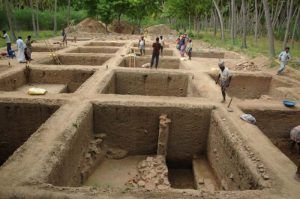The Archaeological Survey of India transferred Amarnath Ramakrishna to Greater Noida from its headquarters in Delhi.
Published Jun 17, 2025 | 4:40 PM ⚊ Updated Jun 17, 2025 | 5:02 PM

Ramakrishna’s work at Keezhadi revealed multiple layers of habitation, including pottery, tools, and other artefacts.
Synopsis: Tamil Nadu Chief Minister MK Stalin accused the Centre of anti-Tamil bias, saying some minds need correction.
Tamil Nadu Chief Minister MK Stalin on Tuesday, 17 June, responded sharply to the central government transferring K Amarnath Ramakrishna, the archaeologist who led the Keezhadi excavations, to Noida.
“How many obstacles do Tamils face? We have been fighting against all of them for thousands of years, and with the help of science, we have been establishing the antiquity of our race,” Stalin said on X
“Yet some minds refuse to accept it. It’s not the statements that need to be corrected; it’s some minds,” he added.
The DMK’s students’ wing has announced a protest rally at Veeraganur in Madurai against Ramakrishna’s transfer on Wednesday, 18 June.
The Archaeological Survey of India (ASI) issued an order on Tuesday transferring Ramakrishna as the Director National Mission on Monuments and Antiquities (NMMA) in Greater Noida from the department’s headquarters in New Delhi.
The latest transfer came even as Ramakrishna refused the ASI’s demand to revise and submit a detailed report on the ancient site near Madurai. The ASI made the demand two years after Ramakrishna had his comprehensive findings, raising questions about the chronology and documentation of one of Tamil Nadu’s most important archaeological discoveries.
The ASI pointed out that two independent experts, who reviewed Ramakrishna’s original report, recommended several corrections to enhance the report’s authenticity and precision.
Ramakrishna refuted the need for a complete rewrite, describing the ASI’s request as contrary to the well-founded conclusions of the Keezhadi excavation.
Keezhadi, located in the Sivaganga district, emerged as a key archaeological site following excavations that commenced in 2016.
Carbon dating of charcoal found during excavations in February 2017 placed the settlement around 200 BCE, suggesting the presence of an urban civilization in Tamil Nadu during the Sangam Age, a period known for its rich literary and cultural heritage.
Ramakrishna’s work at Keezhadi revealed multiple layers of habitation, including pottery, tools, and other artefacts that collectively point toward a sophisticated and ancient Tamil culture with advanced urban planning.
எத்தனை எத்தனை தடைகள் நம் தமிழினத்துக்கு? அத்தனையையும் ஆயிரம் ஆயிரம் ஆண்டுகளாக எதிர்த்துப் போராடி, அறிவியல் துணைக்கொண்டு நம் இனத்தின் தொன்மையை நிறுவி வருகிறோம்!
இருந்தும் ஏற்க மறுக்கின்றன சில மனங்கள். திருத்த வேண்டியது அறிக்கைகளை அல்ல; சில உள்ளங்களை!
நாளை மதுரை வீரகனூரில்,… https://t.co/PGCKawE5Q8
— M.K.Stalin (@mkstalin) June 17, 2025
